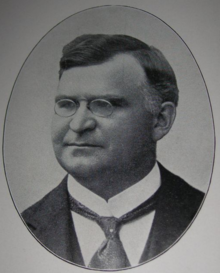Paul Drennan Cravath
| Paul Drennan Cravath | |
|---|---|

Paul Drennan Cravath
|
|
| Born |
July 14, 1861 Berlin Heights, Ohio |
| Died | July 1, 1940 (aged 78) Locust Valley, New York |
| Nationality | United States |
| Education |
Oberlin College Columbia Law School |
| Occupation | Lawyer |
| Known for | The Cravath System |
| Height | 6 ft 4 in (1.93 m) |
| Weight | 240 lb (109 kg) |
| Spouse(s) | Agnes Huntington (1892–1926) |
| Children | Vera Agnes Huntington Cravath |
Paul Drennan Cravath (July 14, 1861 – July 1, 1940) was a prominent Manhattan lawyer and a partner of the law firm today known as Cravath, Swaine & Moore.
The earliest known male ancestor of Paul Cravath was a weaver in Germany named Kravet who in 1635 married a French Huguenot named La Bodouine. The family subsequently moved to Wales where the name "Kravet" was changed to "Cravath". The weaver's son, Ezekiel, emigrated to Massachusetts in the middle of the 17th century. The word Kravet is of Sorb, Czech or Polish origin - meaning "tailor" (from "kroit" to cut).
Paul graduated from Columbia Law School in 1886 and was awarded first Municipal Law prize.
He joined the law firm of Blatchford, Seward & Griswold in 1899. His book of business included: Bethlehem Steel, Baltimore and Ohio Railroad, Kuhn, Loeb & Co., Chemical Bank, E. R. Squibb & Sons, Columbia Gas & Electric, Studebaker Corp. His name was added to the firm's moniker in 1901. Cravath was the authoritative head of the firm from 1906 until his death in 1940, and his formal statement of his conceptions of proper management of a law office still controls its operations. Even today, that law firm structure is widely called "the Cravath System."
Cravath was highly influential in foreign policy as a leader of the "Atlanticist" movement, comprising influential upper-class lawyers, bankers, academics, and politicians of the Northeast, committed to a strand of Anglophile internationalism. For Cravath, the conflict served as an epiphany, building a deep concern with foreign policy that dominated his remaining career. Fiercely Anglophile, he demanded American intervention in the war against Germany. His goal was to build close Anglo-American cooperation that would be the guiding principle of postwar international organization.
...
Wikipedia
